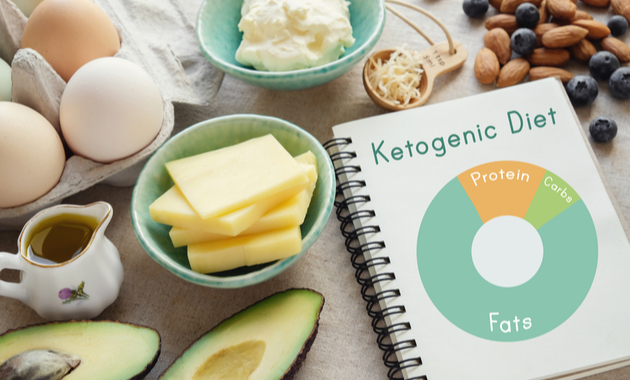The Ketogenic Diet, also known as keto diet, has been snatching the limelight of the world ever since the “quick weight loss” industry started gaining momentum. Keto diet was initially invented to treat health conditions like epilepsy and seizures. Now, since celebrities started endorsing the keto diet for weight loss and management, it is now being widely used for weight loss and for the management of diseases like Type 2 Diabetes.
How does keto diet affect your body?

Keto Diet is a low-carb eating plan that is composed of 75% of fat and the remaining 20-35% includes both carbohydrates and protein.
Due to the drastic decrease in the consumption of carbohydrates and a comparative increase in the consumption of fats, the body moves into a metabolic process known as Ketosis. Ketosis is a process where the body goes into a state of starvation and starts breaking down stored fats instead of carbohydrates and produces ketone bodies. Ketone bodies are lipid molecules produced by the liver. The primary function of the ketones is to break the excess body fat, sparing of lean muscle and improving insulin sensitivity [1].
Types of Keto Diet
1. Standard Ketogenic Diet: An eating plan which is made of 75% fat, 20% protein and only 5% carbohydrates
2. Very Low Carb Ketogenic Diet: A diet with no more than 50g of carbohydrates per day [2][3]
3. MCT Ketogenic Diet: Also known as Medium Chain Triglyceride Diet, it is not based on the division of diet ratios. Instead, it uses MCT oil in food, namely, coconut oil for the production of ketone bodies.
4. Cyclical Ketogenic Diet: It is a rotation between high-carb diet day to low-carb diet day in order to bring the body out of ketosis.
5. Targeted Ketogenic Diet: In this, adding of carbohydrates is allowed around the workout hours.

Is keto diet safe?
Using keto diet for weight loss can be safe only if you follow it under expert supervision. Keto diet requires to be handled with close supervision and care because you may need timely check-ups of your blood parameters since it involves high fat, minimal protein and very low carb intake.
What happens if you follow keto diet without supervision?
If not done under guidance, keto diet may cause numerous health implications such as:
– Nutrient Deficiencies
– Liver Disorders
– Kidney Disorders
– Constipation
– Mood Swings
– Osteoporosis
– High Uric Acid
Keto diet for weight loss
Some studies suggest that the keto diet is one of the most effective and efficient ways to lose weight, but is not often sustained [4] [5]. Due to the drastic shift from eating a carbohydrate-loaded diet to a fat-loaded diet, the body tends to shift into ketosis and burn fats at a fast pace. It was noted that a majority of individuals who follow a low-carb, keto diet for weight loss tend to lose more weight in the first 3-6 months as compared to those people who consume balanced diets.
In contrast, researchers also suggest that a low-carbohydrate keto diet does not have any metabolic advantages and the weight loss is simply due to the reduced calorie intake. The weight loss could also be because of the increased satiety of protein which gives a feeling of fullness for a prolonged period of time, preventing you from overeating [1] [3].
Weight Loss is 99% Mental and 1% Physical. Start Your Journey Today.

Keto diet: What to eat, what to avoid?
List of foods that are allowed in keto diet:
– Eggs
– Red meat and lean meat
– Butter and cream
– Cheese
– Vegetables like broccoli, mushrooms, bell peppers, onions
– Avocado
– All fatty fish such as Tuna, Salmon, Mackerel
List of foods that should be avoided in keto diet:
– Grains like wheat, rye, oats, buckwheat, quinoa, sourdough, barley, rice. Also, it is important to consider that pasta, bread, pizzas, etc. made from any of the grains would be high in carbs.
– Fruits like apple, oranges, bananas, mangoes, grapes, pears. Dried fruits such as raisins, dates and dried mangoes. Fruit smoothies and fruit juices (except lemon and lime juice). It is recommended to avoid frozen fruits as they may have been sweetened before and might add up in the carb count.
– Vegetables like potatoes, sweet potatoes, peas, corn.
– Legumes like kidney beans, lima beans, pinto beans.
– Sugar-free diet foods because they are high in sugar alcohol and may prohibit the production of ketones.
– Alcohol and alcoholic beverages
– Highly processed foods such as mayonnaise, jams, etc.
Takeaway
Research on keto diet is underway. Scientists are also trying to understand how to utilize this diet form to its full potential. However, it is noteworthy that despite several risk factors, keto diet can prove beneficial when followed strictly under expert supervision.
Remember
Individuals suffering from any type of chronic illnesses MUST consult their doctors before following a keto diet.


